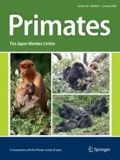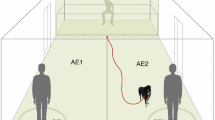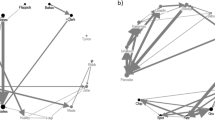Abstract
Non-conscious mimicry is a highly conserved component of animal behavior with multifaceted connections to sociality across taxa. One intriguing consequence of this mimicry in primates is that it promotes positive social feedback from the recipient toward the mimicker. This suggests that mimicry in primates may be an important aspect of positive social interaction, but few studies have tracked the consequences of mimicry in naturally occurring complex social conditions. Here, we designed a novel ethogram to characterize mimicry between conspecifics, to better understand whether mimicry is associated with affiliation between primates in a semi-naturalistic captive setting. In this study, 15 juvenile (aged 2–4 years) rhesus macaques (Macaca mulatta) were observed at the California National Primate Research Center. Frequencies of mimicry defined a priori (e.g. following, postural mimicry) were observed over a course of 12 weeks. In separate observations during the same period, focal social behavior (e.g. aggression, play, affiliation) with group members was also observed. Subjects that exhibited higher degrees of mimicry were not more prosocial, but they received significantly more play overtures from social partners (p < 0.01). Additionally, rates of mimicry were higher in 2- and 3-year-olds than 4-year-olds. These results provide proof of principle in a small sample of monkeys that mimicry is associated with social advantages in a complex, semi-naturalistic setting in primates.




Similar content being viewed by others
References
Altman J (1974) Observational study of behavior: sampling methods. Behaviour 49:227–267
Archie EA, Tung J, Clark M, Altmann J, Alberts SC (2014) Social affiliation matters: both same-sex and opposite-sex relationships predict survival in wild female baboons. Proc R Soc Lond Biol. https://doi.org/10.1098/rspb.2014.1261
Bliss-Moreau E (2017) Constructing nonhuman animal emotion. Curr Opin Psychol 17:184–188
Bonnie KE, De Waal FB (2007) Copying without rewards: socially influenced foraging decisions among brown capuchin monkeys. Anim Cogn 10:283–292. https://doi.org/10.1007/s10071-006-0069-9
Byrne RW, Tanner J (2006) Gestural imitation by a gorilla: evidence and nature of the capacity. Rev Int Psicol Ter Psicol 6:215–231
Byrne RW, Bates LA (2010) Primate social cognition: uniquely primate, uniquely social, or just unique? Neuron 65(6):815–830
Carpenter M, Call J (2009) Comparing the imitative skills of children and nonhuman apes. Rev Primatol. https://doi.org/10.4000/primatologie.263
Carpenter M, Akhtar N, Tomasello M (1998) Fourteen-through 18-month-old infants differentially imitate intentional and accidental actions. Infant Behav Dev 21(2):315–330
Chartrand TL, Bargh JA (1999) The chameleon effect: the perception—behavior link and social interaction. J Pers Soc Psychol 76:893. https://doi.org/10.1126/science.451593
Chartrand TL, Van Baaren R (2009) Human mimicry. Adv Exp Soc Psychol 41:219–274
Clay Z, Palagi E, de Waal FB (2018) Ethological approaches to empathy in primates. Neuronal correlates of empathy. Academic Press, Amsterdam, pp 53–66
Demuru E, Palagi E (2012) In bonobos yawn contagion is higher among kin and friends. PLoS ONE 7(11):e49613
Feneran AN, O’donnell R, Press A, Yosipovitch G, Cline M, Dugan G, Papoiu DP, Nattkemper LA, Chan YK, Shively CA (2013) Monkey see, monkey do: contagious itch in nonhuman primates. Acta dermato-venereol 93(1):27–29
Ferrari PF, Visalberghi E, Paukner A, Fogassi L, Ruggiero A, Suomi SJ (2006) Neonatal imitation in rhesus macaques. PLoS Biol 4:e302. https://doi.org/10.1371/journal.pbio.0040302
Galef BG (2013) Imitation and local enhancement: detrimental effects of consensus definitions on analyses of social learning in animals. Behav Proc 100:123–130
Heyes C (2001) Causes and consequences of imitation. Trends Cogn Sci 5(6):253–261
Jazrawi SE (2000) Postural congruence in a captive group of chimpanzees (Pan troglodytes). University of Calgary, Calgary
Kinnally EL (2014) Epigenetic plasticity following early stress predicts long-term health outcomes in rhesus macaques. Am J Phys Anthropol 155:192–199. https://doi.org/10.1002/ajpa.22565
Kinnally EL, Whiteman HJ, Mason WA, Mendoza SP, Capitanio JP (2008) Dimensions of response to novelty are associated with social engagement and aggression in adult male rhesus macaques (Macaca mulatta). J Comp Psychol 122(2):195
Kinnally EL, Tarara ER, Mason WA, Mendoza SP, Abel K, Lyons LA, Capitanio JP (2010) Serotonin transporter expression is predicted by early life stress and is associated with disinhibited behavior in infant rhesus macaques. Genes Brain Behav 9(1):45–52
LaFrance M (1982) Posture mirroring and rapport. In: Davis M (Ed) Interaction rhythms: Periodicity in communicative behavior. Human Sciences Press, New York, pp 279–298
Lakin JL, Jefferis VE, Cheng CM, Chartrand TL (2003) The chameleon effect as social glue: Evidence for the evolutionary significance of nonconscious mimicry. J Nonverbal Behav 27(3):145–162
Lyons D, Mendoza S, Mason W (1992) Sexual segregation in squirrel monkeys (Saimiri sciureus): a transactional analysis of adult social dynamics. J Comp Psychol 106(4):323–330
Machado CJ, Bliss-Moreau E, Platt ML, Amaral DG (2011) Social and nonsocial content differentially modulates visual attention and autonomic arousal in rhesus macaques. PLoS ONE 6(10):e26598
Mancini G, Ferrari PF, Palagi E (2013) In play we trust. Rapid facial mimicry predicts the duration of playful interactions in geladas. PLoS ONE 8:e66481. https://doi.org/10.1371/journal.pone.0066481
Miller NE, Dollard J (1941) Social learning and imitation. Yale University Press, New Haven, CT
Nagell K, Olguin RS, Tomasello M (1993) Processes of social learning in the tool use of chimpanzees (Pan troglodytes) and human children (Homo sapiens). J Comp Psychol 107:174. https://doi.org/10.1037/0735-7036.107.2.174
Palagi E, Leone A, Mancini G, Ferrari PF (2009) Contagious yawning in gelada baboons as a possible expression of empathy. Proc Natl Acad Sci 106(46):19262–19267
Paukner A, Anderson JR (2006) Video-induced yawning in stumptail macaques (Macaca arctoides). Biol Let 2(1):36–38
Paukner A, Suomi SJ, Visalberghi E, Ferrari PF (2009) Capuchin monkeys display affiliation toward humans who imitate them. Science 325:880–883. https://doi.org/10.1126/science.1176269
Paukner A, Ferrari PF, Suomi SJ (2011) Delayed imitation of lipsmacking gestures by infant rhesus macaques (Macaca mulatta). PLoS ONE 6(12):e28848
Paukner A, Simpson EA, Ferrari PF, Mrozek T, Suomi SJ (2014) Neonatal imitation predicts how infants engage with faces. Dev Sci 17:833–840. https://doi.org/10.1111/desc.12207
R Core Team (2016) R: A language and environment for statistical computing. R Foundation for Statistical Computing, Vienna, Austria. URL https://www.R-project.org/
Ross MD, Menzler S, Zimmermann E (2008) Rapid facial mimicry in orangutan play. Biol Lett 4:27–30. https://doi.org/10.1098/rsbl.2007.0535
Silk JB (2007) Social components of fitness in primate groups. Science 317:1347–1351. https://doi.org/10.1126/science.1140734
Silk JB, Alberts SC, Altmann J (2003) Social bonds of female baboons enhance infant survival. Science 302:1231–1234. https://doi.org/10.1126/science.1088580
Silk JB, Beehner JC, Bergman TJ, Crockford C, Engh AL, Moscovice LR, Cheney DL (2010) Strong and consistent social bonds enhance the longevity of female baboons. Curr Biol 20:1359–1361. https://doi.org/10.1016/j.cub.2010.05.067
Simpson EA, Paukner A, Sclafani V, Suomi SJ, Ferrari PF (2013) Lipsmacking imitation skill in newborn macaques is predictive of social partner discrimination. PLoS ONE 8:e82921. https://doi.org/10.1371/journal.pone.0082921
Simpson EA, Miller GM, Ferrari PF, Suomi SJ, Paukner A (2016) Neonatal imitation and early social experience predict gaze following abilities in infant monkeys. Sci Rep. https://doi.org/10.1038/srep20233
Snyder-Mackler N, Burger JR, Gaydosh L, Belsky DW, Noppert GA, Campos FA, Bartolomucci A, Claire Yang Y, Aiello AE, O’Rand A, Harris KM, Shively CA, Alberts SC, Tung J (2020) Social determinants of health and survival in humans and other animals. Science. https://doi.org/10.1126/science.AAxX9553
Subiaul F, Cantlon JF, Holloway RL, Terrace HS (2004) Cognitive imitation in rhesus macaques. Science 305:407–410. https://doi.org/10.1126/science.1099136
Team, RStudio (2015) RStudio: integrated development for R. RStudio, Inc., Boston, MA URL https://www.rstudio.com
Tennie C, Call J, Tomasello M (2012) Untrained chimpanzees (Pan troglodytes schweinfurthii) fail to imitate novel actions. PLoS ONE 7(8):e41548
Thorpe WH (1963) Antiphonal singing in birds as evidence for avian auditory reaction time. Nature 197(4869):774–776
Voelkl B, Huber L (2000) True imitation in marmosets. Anim Behav 60:195–202. https://doi.org/10.1006/anbe.2000
Weinstein TA, Capitanio JP (2008) Individual differences in infant temperament predict social relationships of yearling rhesus monkeys, Macaca mulatta. Anim Behav 76:455–465. https://doi.org/10.1016/j.anbehav.2008.01.024
Weinstein TA, Capitanio JP (2012) Longitudinal stability of friendships in rhesus monkeys (Macaca mulatta): individual-and relationship-level effects. J Comp Psychol 126:97. https://doi.org/10.1016/j.anbehav.2008.01.024
Whiten A, Custance DM, Gomez JC, Teixidor P, Bard KA (1996) Imitative learning of artificial fruit processing in children (Homo sapiens) and chimpanzees (Pan troglodytes). J Comp Psychol 110:3. https://doi.org/10.1037/0735-7036.110.1.3
Worch EA (2012) Play initiating behaviors and responses in red colobus monkeys. Am J Play 5:104. https://doi.org/10.1037/0735-7036.110.1.3
Zentall TR (2003) Imitation by animals: how do they do it? Curr Dir Psychol Sci 12:91–95. https://doi.org/10.1111/1467-8721.01237
Acknowledgements
This work was funded by the California National Primate Research Center Base Grant (P51 OD0011107) and UC Davis Provost’s Undergraduate Research Fellowship as well as NSF GRFP #2018264636 (to JA).
Author information
Authors and Affiliations
Corresponding author
Ethics declarations
Conflict of interest
The authors have no conflicts of interest to declare.
Additional information
Publisher's Note
Springer Nature remains neutral with regard to jurisdictional claims in published maps and institutional affiliations.
Electronic supplementary material
Below is the link to the electronic supplementary material.
About this article
Cite this article
Anderson, J.A., Kinnally, E.L. Behavioral mimicry predicts social favor in adolescent rhesus macaques (Macaca mulatta). Primates 62, 123–131 (2021). https://doi.org/10.1007/s10329-020-00861-y
Received:
Accepted:
Published:
Issue Date:
DOI: https://doi.org/10.1007/s10329-020-00861-y




